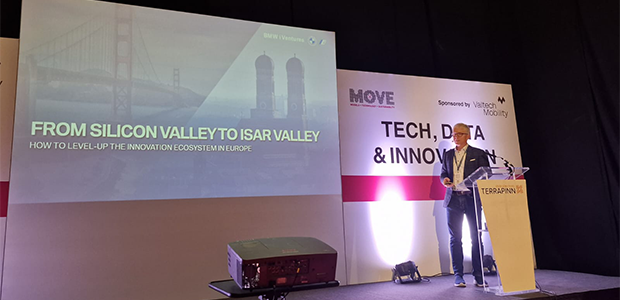
BMW i Ventures: How to level up the innovation ecosystem in Europe
At MOVE 2024, Marcus Behrendt, Managing Director of BMW i Ventures, discussed how the innovation ecosystem could be levelled up to match the model that is currently seen in North America.
BMW i Ventures is the Corporate Venture arm of BMW Motors. Whilst BMW’s ‘mothership’ is based in Munich, Germany, when forming the CVC arm of the business, it was decided that it should be based in Silicon Valley. Behrendt said: “We decided that our headquarters should be in Silicon Valley. If you talk about venture and venture capital, this is where the heart is, right?
“The idea was to be a little bit away farther away from the mothership. So, you get out of the control, get away, and do your business there. As we all know, venture investing is following a J-curve. The first three to four years are really bad and ugly and returns a negative. So, we were basically off the radar for five to six years operating on the West Coast.”
This physical distance away from BMW’s headquarters also allows the venture arm to work completely separately from the main company. The space has allowed the CVC arm to grow and flourish, whilst maintaining the BMW brand through its ventures.
Corporate investing
Before a corporate invests in a startup, it first needs to be sure of a few qualities.
“Why should we invest as a corporate? We're strongly believing that venture business should, first and foremost, be financially attractive or financially viable, because if somebody has a good idea, in the end, that's often not enough to pursue the market and to sustainably run a business. So the first idea must be that the idea is financially attractive and will have the chance to grow fast.
“Much of our business is differentiating between companies that are better off growing slowly and are strategically relevant for us.”
Behrendt explained that whilst sometimes investing in startups is a one or another situation, ideally, CVCs want to see the best of both in a business, as the act of investing is to create a win-win set-up for both parties involved. “We find companies that will strive and hopefully one day will be attractive for and very important in the automotive industry.”
Whilst there are many similarities between VCs and CVCs, one of the biggest differentiators, especially within the mobility space, is that CVCs often become customers of the startups that they invest in.
“Corporate venture arm invests, then we usually not just bring money and demand to the table, we bring a lot of infrastructure products, industrialisation support, we bring internal experts, maybe even we become a client. We buy your first product and look into what it actually can help you develop for the next stage.”
“Also, as a corporate we need more outside perspective, we need access to thought leaders in the industry, and mostly importantly, we need people that are willing and allowed to take risks.
“Startups are de-risking corporates, because they're focused on one technical or service solution only. That's what they go for. We always have to juggle many, many projects. Only startups can be so focused and so clear, and going forward, if this thing works, it can become a flywheel and that's the triple win, we will together grow in worth and value and then we have the third win everybody is happy with a stronger and bigger valuation.”
Not only do the startups win from gaining investment from corporates, but the corporates are able to use these new, innovative products faster than if produced in house. Investing in such startups allows corporates to remain nimble and have its finger on the technological pulse, without developing such an innovation that could take many years to be implemented.
USA and Europe
In terms of the startup ecosystem, there is a big difference between the USA and Europe. Behrendt mentioned: “
“There is much more money and much more going on in North America. And the question for me is how can we actually actually counter this? How can we have thriving ecosystems just like in the US, because the knowledge, education, and people are here.
“The problem is Europe is not just one country, and they all have different jurisdictions, they have all different rules. We have investigated investments in Switzerland, which are very, very different from an investment in the UK. That is something that we really need to take hold of in order to be competitive to the North American market. There, every company is a Delaware Corp. If you're a California LLC, we will tell you, you have to refer them as a Delaware Corp, otherwise we don't do it. Because the tiny state of Delaware has actually built a corporate governance system, which everybody follows clear rules. It's complex, but it's clear and structured. They provide courts, jurisdiction, everything. It’s very important that we have a common set of rules throughout Europe, for the industries to work in this space.”
The main takeaway of Behrendt’s talk is that Europe needs to take a leaf out of the USA’s book when it comes to the startup and investment ecosystem. Regulations need to become more unified to ensure a more robust and healthy startup ecosystem, that encourages larger investments.

